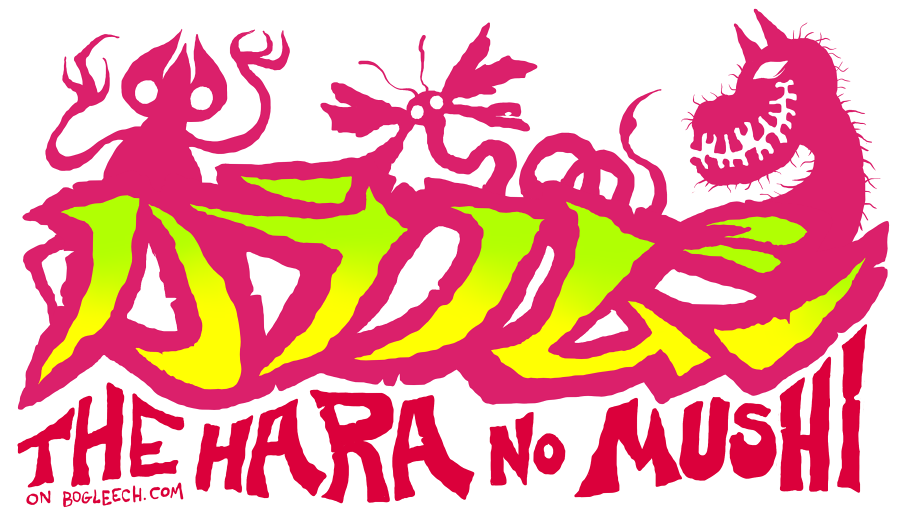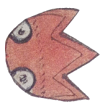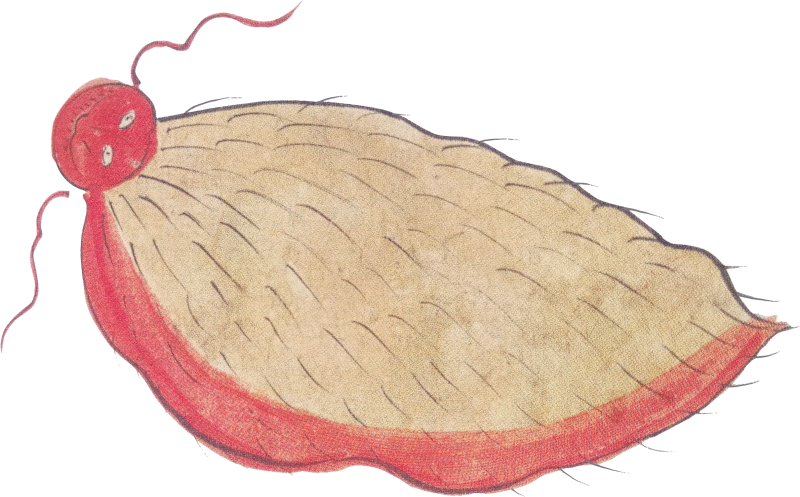
DAY TWENTY SEVEN: KANSHAKU or HIKI
("Liver Mass" or "Fat Spirit")
Written by Jonathan Wojcik, Researched and Translated by Rev Storm
The book also specifies that this bug is "shaped like a woman's breast," with the head as the nipple.
Design Review:
I just thought this one was an interesting, hairy slug with a mean little face, and I even thought it looked exceptionally like a parasitic fluke. Instead it turns out it's a crawling booby, which, really is quite a bit more interesting, and its symptoms...are basically all the side effects of pregnancy, huh? Soreness, mood swings and cravings.What's with those, anyway? If you didn't know already, you're gonna love the answer.
TODAY'S REAL WORLD "PARASITE?:"
Placental Pregnancy

SURPRISE! Sometimes the parasite was you all along! It's not uncommon to hear human babies likened to some kind of parasitic monster, and like we said about cancer just a page ago, that's not considered a scientifically sound comparison for the simple reason that a baby is generally of the same species as its parent. HOWEVER, neither is the comparison entirely unreasonable...and in fact, it's probably more apt than a lot of people ever imagined.
Most animals, as you know, are egg layers. The egg is created with all the nutrients a developing embryo will ever need, sealed off with a protective shell and dumped outside the body to continue developing externally. Simple! But things get a lot weirder and messier with live-bearers, and MOST especially with us primates. Even in most other mammals, pregnancy is usually a much safer process; their blood supply is isolated from the developing young, and nutrients are provided to them through a carefully controlled filtration system that the mother's body can essentially shut off in an emergency, limiting what the embryos can take or even canceling the whole affair.
In humans, apes, monkeys and a few other mammals, this works very differently. The cells of our placentas effectively "digest" the walls of the uterus, which is thickly lined and packed with immune cells to hold up as best as it can against this hostile process. Eventually the placenta eats its way into the parent's arteries, paralyzes them so they can't contract, and floods them with growth hormones. This greatly widens the vessels to collect as much blood as possible for the fetus, and it's exactly why we're among the relatively fewer mammals who can't simply halt and re-absorb a pregnancy whenever we're feeling too stressed or too malnourished to see it through.
Incidentally, those embryonic cells are so invasive that small clusters of them can permanently colonize organs throughout the body and persist there for the rest of the parent's life, and many of the genes associated with embryonic development are the very same genes that cancer can use to grow and spread.
As it continues to develop, the human fetus increasingly releases hormones to alter the parent's metabolic processes, increase blood sugar and blood pressure to receive even more sustenance and even significantly suppress the immune system, lest it be attacked as the body would any invader. For each of these special attacks unleashed by the growing fetus, their parent's body has a unique counter-attack, and this delicate, hormonal "tug of war" is why human pregnancy comes with so much pain, nausea, mood swings, bizarre cravings and a staggering list of potential complications and failures.
We've actually just barely scratched the surface of this subject, but you should get the idea by now; we humans have some of the most aggressive, most dangerous offspring on the planet, and they really do share the exact same tactics as parasitic organisms, circumventing the "host's" natural defense mechanisms to take more nutrients than they're "supposed" to get. Again, this is not just how pregnancy normally works among the animal kingdom. It's highly unusual, and it's why our species also has an exceptionally high rate of maternal death.
It is also, however, the very reason why we are what we are. Up to a quarter of your protein intake was once devoted to waging all that aggressive, invasive biochemical warfare against whoever it was you popped out of, but that's just what provided you with enough material to build such a complicated consciousness. It is another of our most unusual characteristics that we're born with such massively developed brains so empty of any information, huge vessels that fill with data at an astonishing rate compared to most other known organisms.
...But, the greed and gluttony of that big brain is still dictating your life and demanding a relatively enormous share of your daily caloric intake even now, so maybe the real parasite here is the squishy, wrinkly one in your skull, which might also sometimes feel like making you sad for no reason or play the same loud, obnoxious song on a loop for twenty hours at a time.
NAVIGATION:





































































